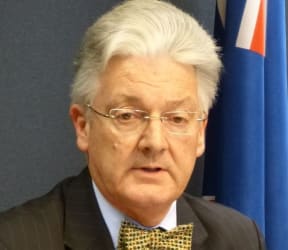United Future leader Peter Dunne has lost another role at Parliament - he no longer has a seat on the Intelligence and Security committee.
Mr Dunne resigned from his ministerial roles on Friday after refusing to comply with an inquiry into who leaked a report on the Government Communications Security Bureau (GCSB).

Peter Dunne. Photo: RNZ
Mr Dunne was one of five MPs on the committee, chaired by Prime Minister John Key, and had oversight of the intelligence services, the SIS and the GCSB.
The Prime Minister said on Monday that, as the Ohariu MP is no longer a minister, it was not appropriate for him to be on the committee. Government minister Tony Ryall will take his place.
Peter Dunne is on leave from Parliament this week, so will avoid further questions from the media and Opposition MPs about whether he had a role in leaking the GCSB report. The House is in recess next week.
John Key ordered the inquiry into illegal surveillance and the current operations of the GCSB by David Henry after Fairfax Media was shown a copy of Cabinet Secretary Rebecca Kitteridge's report in April this year, a week before Mr Key was due to release it.
Mr Henry said Peter Dunne did not fully co-operate with requests made to him relating to emails between the MP and the reporter to whom the Kitteridge report was leaked. It found Mr Dunne and the reporter exchanged 86 emails during the fortnight before it was leaked, but that the MP only provided edited versions of 44 emails.
The Labour Party hopes to take the matter further and has asked Parliament's Speaker David Carter to consider referring the matter to the privileges committee. It has lodged a complaint over a statement made by Mr Dunne to the Finance and Expenditure select committee at the end of May.
Labour leader David Shearer said on Monday that when Mr Dunne appeared before the select committee, he denied leaking the report. Mr Shearer said the outcome of the Henry inquiry shows suspicion falls on Mr Dunne as the source of the leak, due to his refusal to cooperate, and an investigation by the Privileges Committee is required to get to the truth of the matter.
Peter Dunne insists that he did not leak the report.
Peters bluffing, says PM
Prime Minister John Key says New Zealand First leader Winston Peters is bluffing when he claims to have evidence that Peter Dunne was the source of the leak.
It is an offence to release official information likely to prejudice the security or defence of New Zealand.
Mr Peters has laid a complaint with police, saying it is a matter of national security. Police are assessing to see if it meets the threshold for investigation. However, Mr Key doubts Mr Peters has evidence to back up his claims.
"Last week he was going on about the phone records - they don't seem to be actually registered as a major issue in the Henry report. I think it's normal modus operandi for Winston Peters - you know, bluff and bluster and claim you have lots of information. If he's got them he should release them, I bet he doesn't have them."
The Prime Minister said he still wants to trust Mr Dunne.
University of Otago law professor Andrew Geddis does not believe police will find any evidence of a crime in the leaking of the report.
Professor Geddis told Radio New Zealand's Nine to Noon programme on Monday that appendices to the report may have had a higher security classification, but there is no evidence that they were also leaked.
Meanwhile, Fairfax Media says it will not take up Peter Dunne's invitation to comment on whether he was or was not the source of the leaked report.
Group executive editor Paul Thompson told Nine to Noon it is a fundamental tenet of journalism to not discuss confidential sources. Mr Thompson said Fairfax is 100% behind the reporter and the decision to publish the story. National security and legal matters were considered, but it was decided that the story was in the public interest.

